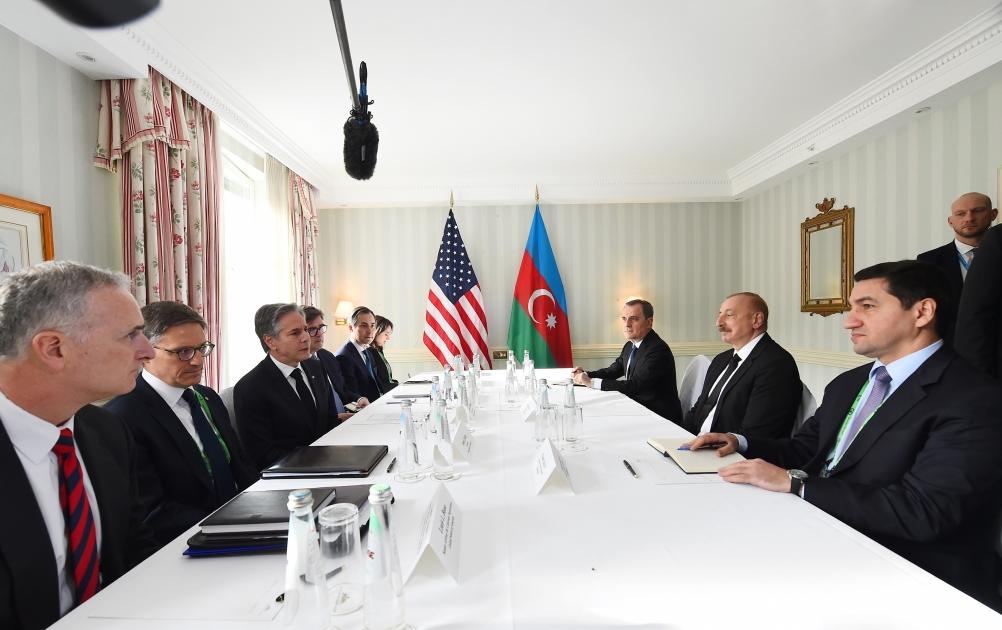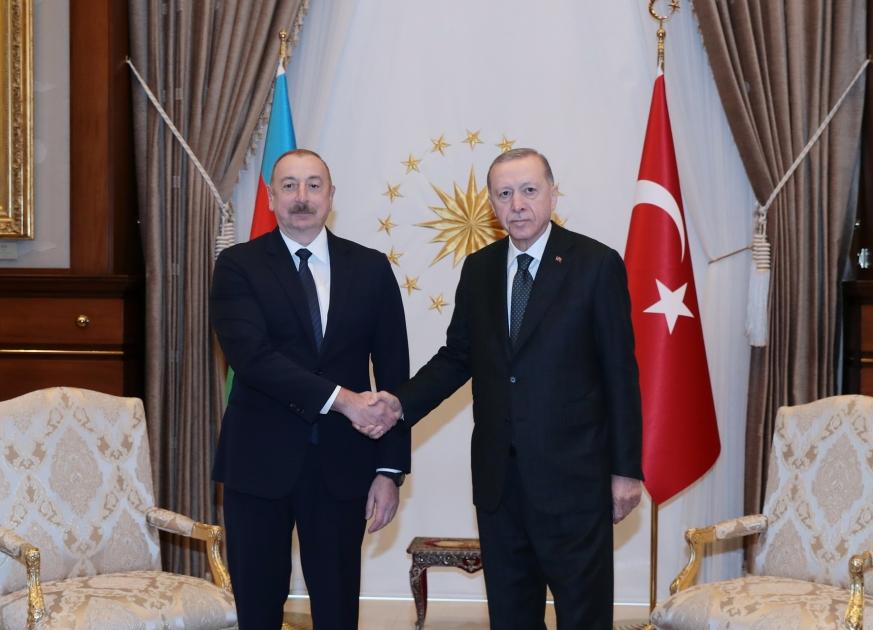Aliyev shores up Azerbaijan's international clout promoting global positive agenda Shedding the shackles of the past
The year 2024 is off to a very energetic start for our country. And the quality of this energy has taken on a whole new dimension. The snap presidential election on February 7 and the confident victory of incumbent President Ilham Aliyev marked the transition to a new paradigm of Azerbaijan's foreign policy development. In the past, the liberation of the occupied territories was the number one national goal. Now, after the glorious victory and full restoration of sovereignty, the country's position in the global world is at stake. This was the central idea of Ilham Aliyev's inaugural speech in Milli Majlis on February 14.
Aliyev announced that the issue of the normalisation of Armenian-Azerbaijani relations would be taken off the international agenda. This does not only mean that there will be no mediation in the negotiations, but also that from now on international relations will be conducted in isolation from the Armenian-Azerbaijani conflict. It means that we have shed the heavy weight imposed on us by the world establishment to restrict our movements. It means we are free to fulfil our true global mission. Having said that, Aliyev is not just going to sit back and wait for the world to accept where we stand. On the contrary, knowing the political signature of the Azerbaijani leader, we can assume that before expressing this thought from the high podium of the Milli Mejlis, the president and his team have already been working to bring the world community to the image of the world as seen from Baku.
The proof of this was the trip of President Aliyev to the International Conference on Security in Munich at the invitation of the German side. A lot has already been said about it, but in the context of this article, I would like to reiterate the fact that all the meetings of President Aliyev in Munich were initiated by the opposite sides. Many heads of state, governments, leading international financial centres and authoritative organisations asked Aliyev to meet. Undoubtedly, this indicates Azerbaijan's growing global role and Ilham Aliyev's authority. Just imagine: President Aliyev had 24 meetings in two days. Unfortunately, due to lack of time, it was not possible to hold another ten meetings.
Of course, the most notable of Aliyev's meetings in Munich were with German Chancellor Olaf Scholz, OSCE Chairman-in-Office Jan Borg and four US officials - Secretary of State Anthony Blinken, Special Coordinator for Global Infrastructure and Energy Security Amos Hochstein, Special Envoy for Climate Change John Kerry and Rockefeller Fund Senior Vice President for Strategic Communications, Policy and Public Affairs Eileen O'Connor.

The details of these meetings and the issues discussed have already received extensive media coverage. It is worth noting that almost none of these important meetings focused on the issue of the Armenian-Azerbaijani settlement. Only the conversation between President Aliyev and the Chairman of the OSCE did not fail to focus on this issue, and then only in the context of the OSCE closing down all the structures related to the mediation of the Karabakh conflict, which has been forgotten due to the loss of its relevance.
Discussions with the American representatives focused mainly on Azerbaijan's role in combating climate change, commitment to developing green energy and, of course, the forthcoming COP29 Conference to be held in Baku this year.
It is no secret that, mainly due to the Armenian factor in the foreign policy of the United States, our country's relations with the United States have recently experienced a setback, if not a crisis. The current revival of bilateral relations is due to Baku's determined policy of eliminating the Armenian-Azerbaijani agenda from relations with third countries. The active participation of American representatives in the meeting with Aliyev in Munich testifies to Washington's acceptance of these new realities. The relationship with the United States is returning to its former strength, but on a new foundation. The fact that Energy Minister Perviz Shahbazov is currently in the United States is another example of this change. The Minister is discussing with his American counterparts the prospects of cooperation in the energy sector, as well as projects implemented by Azerbaijan to ensure international energy security. There are also signs of activity in other directions.
The meetings in Munich and Aliyev's invitation to the Davos summit in January this year are, among other things, proof of the invalidity of speculation about Azerbaijan's estrangement, alienation or even isolation from the West. Aliyev's invitation to Munich and requests to meet also show that Western countries and organisations are positive about the results of the presidential elections in Azerbaijan.
Azerbaijan is now in the league of states to be counted on not only to influence regional politics but also to contribute to a positive global agenda. As mentioned above, the COP29 Climate Change Conference was a key issue discussed with Western representatives, and the very election of Azerbaijan to host the COP29 Climate Change Conference made Azerbaijan stand out. Azerbaijan's selection as host of this conference was yet another sign of Azerbaijan's renewed international recognition.
To paraphrase the idea expressed at the beginning of the article, we can say that the attempts to manipulate the conflict for thirty years have ended in a fiasco for the followers of this policy and in the triumph of the sovereignty of our country. Azerbaijan will continue to pursue a balanced policy based on its national interests.

At the same time, Aliyev has declared friendship and partnership with the Turkic states to be one of the main priorities of his foreign policy. Aliyev's first official foreign visit to Türkiye and the post-meeting statements by the leaders of the two brotherly states are once again evidence of this trend. Integration within the framework of the Organisation of Turkic States, on the solid basis of economic interaction at the crossroads of the world's trade routes, is called upon to become a defining factor of policy in the vast area of the South Caucasus and Central Asia.
Armenia should accept the new reality as soon as possible. It is still too early to draw far-reaching conclusions. However, the agreements reached between the leaders of Azerbaijan and Armenia in Munich give rise to some optimism about the soundness of Yerevan's foreign policy course. What Pashinyan now needs is the political will to follow through. Yes, we understand how difficult it can be to buck traditional public opinion, but a strong politician is also one who takes unpopular but vital decisions by force of will and with the mandate of trust. It is also political will that sometimes makes decisions popular after they happen. We must repeat, but this is very important - first of all, official Yerevan must cleanse the political and media space of all reincarnations of the "Nagorno-Karabakh", "NKR", "Artsakh", etc. theme.
Unfortunately, we are once again witnessing unhealthy activities surrounding the February 20 date (when the Karabakh separatist movement began). The "myatsum" figures have once again raised their heads from the quagmire of history, and the "Artsakh representation" is still in Yerevan. The Armenian leadership must find the strength to get rid of all these revanchist manifestations.
In addition, Yerevan should cease the use of the Armenianised toponyms of Karabakh, including in international correspondence, referring to the Karabakh region as "Azerbaijan-occupied", "Artsakh", "NKR" and other ambiguous names.
Most importantly, Armenia should cleanse its legislation of provisions that enshrine territorial claims against Azerbaijan. Only after these steps can there be a real improvement in relations between the two countries, which will certainly benefit the entire South Caucasus region.
In short, Armenia should follow Azerbaijan's example - remove the conflict from the international agenda, stop feeding foreign monsters who do not need peace in the South Caucasus, and become a sovereign state in the full sense of the word.
The South Caucasus must be free.








